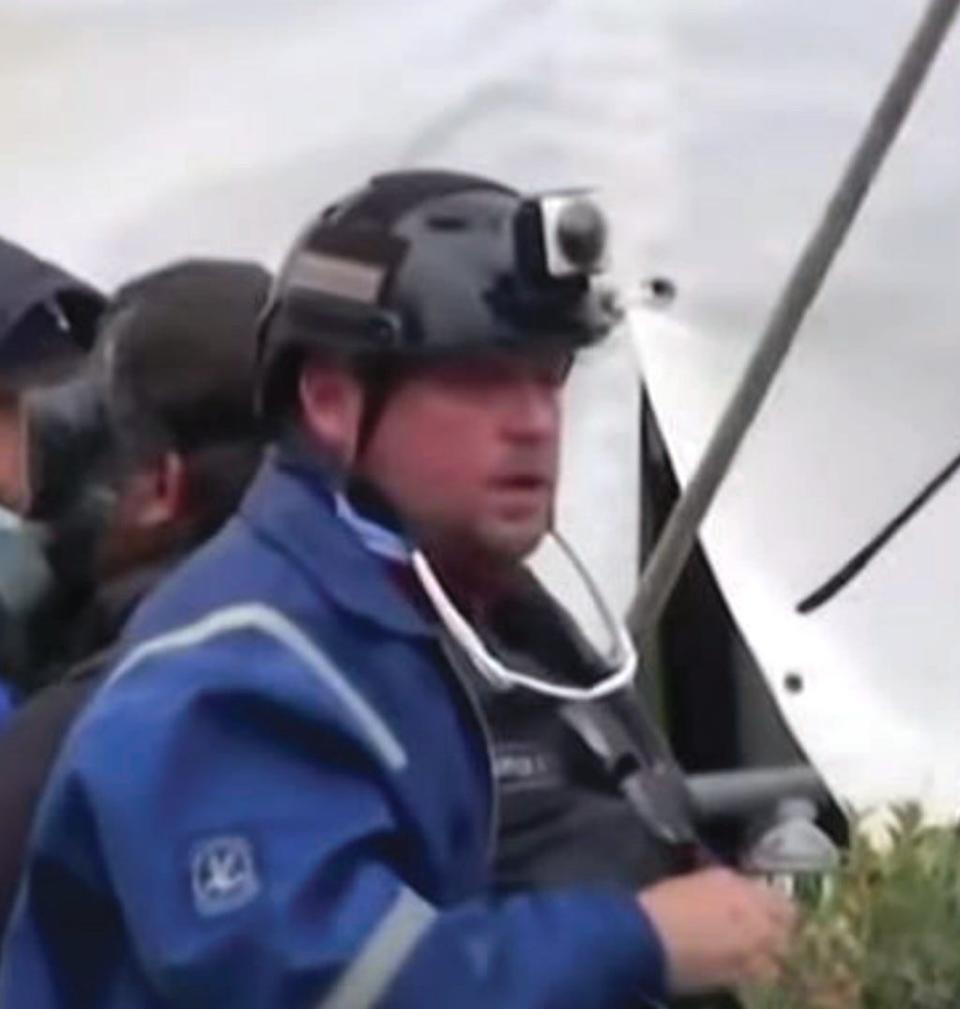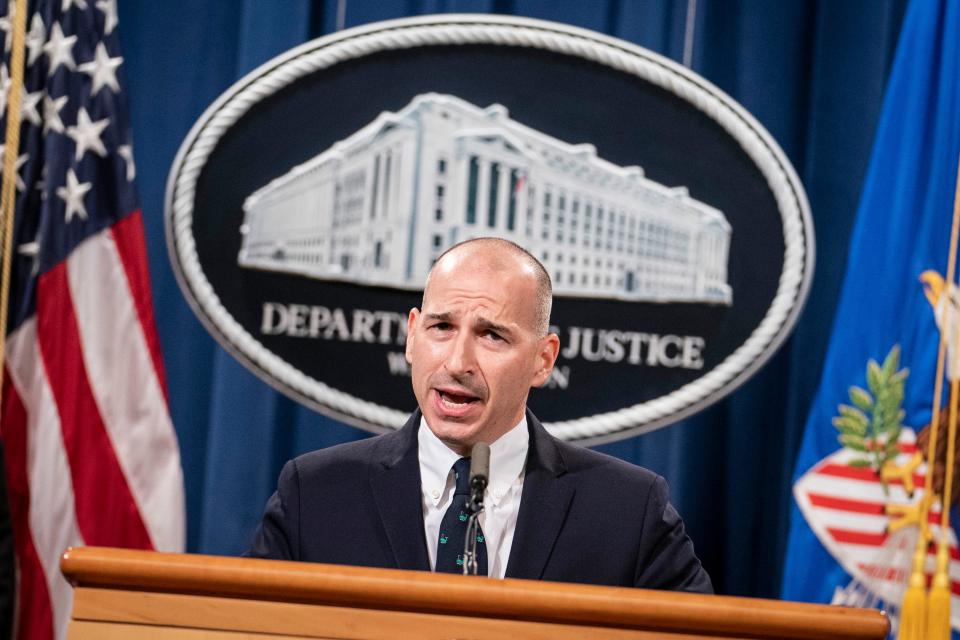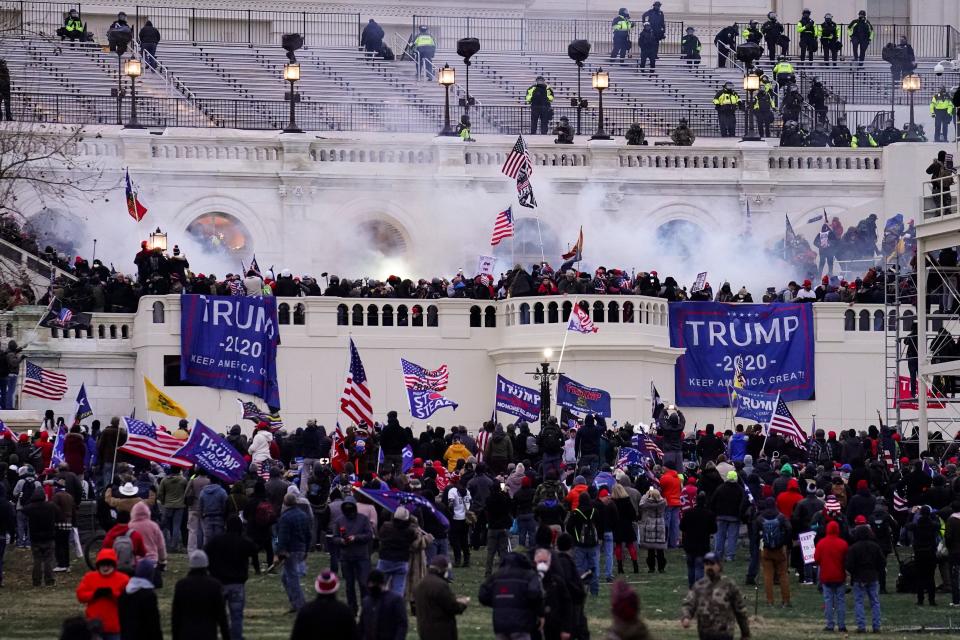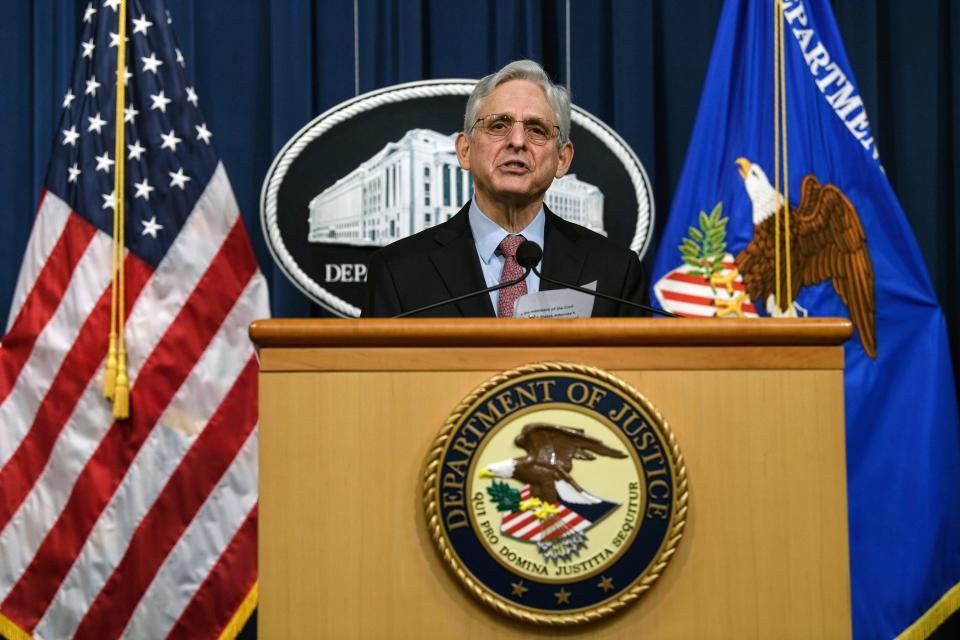A Texas man will be the first Jan. 6 defendant to face a jury. His trial could set the tone for others.
WASHINGTON – Guy Wesley Reffitt isn’t exactly a marquee name, even among the ranks of extremist groups that attacked the U.S. Capitol on Jan. 6, 2021.
On that day, prosecutors said, the suburban Dallas man joined hundreds of others in the assault, but the gun-toting follower of the paramilitary Three Percenters was stopped short of the building's threshold by police and a cloud of chemical repellant.
Court documents, like those filed against more than 700 others, outline a set of charges that could subject him to years in prison: obstructing Congress, interfering with law enforcement, entering the Capitol complex with a weapon and obstruction of justice.
Yet Reffitt’s case is different from hundreds of others that have come before it: It's first one to go to a jury trial.
When Reffitt and the government meet Monday in a Washington federal courtroom, prosecutors will get their first chance to test evidence of the Jan. 6 assault before a jury drawn from the region where the attack took place. Though more consequential cases remain in the pipeline – including allegations of a vast conspiracy by the extremist Oath Keepers group to overthrow the government – the prosecution of the 49-year-old oil and gas industry worker is likely to offer fireworks of its own and a possible template for trials to follow.
From Oklahoma City to Jan. 6: How the US government failed to stop the rise of domestic extremism

Is there a link between Jan. 6 suspects and Trump's inner circle? FBI's questions show hunt is on
Prosecutors signaled they intend to call 13 witnesses, including Capitol Police officers who clashed with the defendant; a Reffitt colleague from the Three Percenters who was granted immunity for his testimony; and a Secret Service agent to recount the frantic efforts to relocate Vice President Mike Pence as the mob closed in.
The prosecution is likely to become intensely personal, as two of Reffitt’s children are set to describe how their father, days after returning from Washington, threatened their lives if they cooperated with the federal investigation.
“If you turn me in, you’re a traitor, and you know what happens to traitors ... traitors get shot,” the father allegedly told his children.
Michael Sherwin, a former acting U.S. attorney in Washington who oversaw the early months of the sprawling Jan. 6 federal investigation, said the case is an opportunity for the government to "show the public how justice should be carried out regardless of politics."

"Because this is the first case before a jury, it's important for the (Justice Department) to show the public the significance of what happened that day," Sherwin said.
Although the government has secured more than 200 guilty pleas in the largest investigation in U.S. history, Michael Bromwich, a former federal prosecutor, said the jury system is essential to maintaining trust in the process.
"The jury system is one of the few institutions that the public still has confidence in," Bromwich said. "It is important for juries to render verdicts in these cases."
More: Vegas parking valet, Yale law graduate, unhinged Oath Keepers leader: Who is Stewart Rhodes?
'Drag legislators out by their heels'
For the government, the Reffitt case is both a chance to tell the story of a horrific day and a window into a massive law enforcement effort that has resulted in more than 750 arrests.
Investigators have drawn on geo-location data and untold numbers of social media postings, and the public flooded federal authorities with hundreds of thousands of tips and pieces of digital media.
More: FBI releases video of 10 rioters who allegedly committed most brutal assaults on police officers
Reffitt prosecutors are likely to pull information from a variety of those sources. Photographs show the suspect wearing a distinctive blue jacket and black helmet at various locations around the Capitol on Jan. 6, but the most powerful evidence is likely to come from more than a dozen witnesses.
Capitol Police, for example, are likely to place an armed Reffitt squarely among the mob that charged law enforcement barricades.
At least three Capitol Police officers are poised to describe their personal encounters with Reffitt, who allegedly challenged their commands to stand down.
According to prosecutors, Reffitt and other rioters allegedly overwhelmed the police lines, "pushing" toward the Capitol.

The actions, according to court documents, prompted officer Shauni Kerkhoff, Sgt. Adam DesCamp and Sgt. Matthew Flood to go on the offensive.
Kerkhoff, who has left the agency but is likely to be one of the government's first witnesses, launched chemical irritants known as "pepper balls" at Reffitt. A volley of nonlethal projectiles, fired by DesCamp, followed, and Flood sprayed Reffitt with more pepper repellant.
"None of these efforts stopped the defendant’s advances," prosecutors said in court documents, until DesCamp discharged another cloud of pepper spray.
More: FBI makes appeal for information in Capitol pipe bomb investigation; video shows hooded suspect
In addition to the Capitol Police officers, U.S. Secret Service Special Agent Paul Wade is set to recount the effort made to relocate the vice president as the advancing crowd disrupted the election certification process and prompted the evacuation of the Senate.
"SA Wade will generally explain the 'emergency actions' that the (Secret Service) took in response to the riot: relocating Vice President Pence and his family members, bringing additional ... personnel to the Capitol, and relocating the Vice President’s motorcade," prosecutors said in court documents.
Reffitt denied that he was part of any intended insurrection. In a letter written after his arrest last year and obtained by ProPublica, Reffitt argued that the crowd's actions on Jan. 6 have been mischaracterized.
"We have been labeled the enemy, yet clearly we see tyranny as the enemy," he wrote. "Jan. 6 was nothing but a satirical way to overthrow the government. If overthrow was the quest it would have no doubt been overthrown.
"Ask the Capitol Police for how it could have been," he wrote. "They are grateful it wasn't a real insurrection complete with mind, body and soul."
Assistant U.S. Attorney Jeff Nestler said Reffitt's aim that day was chillingly violent.
Reffitt, Nestler said at a pretrial hearing Thursday, wanted to "drag legislators out (of the Capitol) by their heels."
‘This is insane’: Lawmakers relive Jan. 6 horror alongside trauma of effort to rewrite history
A trial in the jurors' 'backyard'
The first piece of business in the Reffitt prosecution might be the most challenging: selecting a jury in a courthouse set in the shadow of the Capitol grounds that were transformed into a battlefield more than a year ago.
"Picking a jury could be a very difficult process in a case that literally unfolded in the jurors' backyard," said Jill Huntley Taylor, a Philadelphia-based jury consultant and trial strategist. "The judge and the attorneys will be looking for people who already have made up their minds. They will likely want to know their political views, whether they posted anything about the event on social media."
Because of the intense media coverage and the jurors' proximity to the Capitol, Taylor said the trial judge could set a "higher bar" for disqualifying prospective panelists from serving.
U.S. District Judge Dabney Friedrich, who is overseeing the case, offered a glimpse into the selection process Thursday during the lengthy pretrial hearing, which set guidelines for a public trial in the midst of a pandemic.
Friedrich said the Reffitt panel of 12 and four alternates will be drawn from a pool of 80 people set to report Monday to the E. Barrett Prettyman U.S. Courthouse.
The judge signaled that the panelists would be pressed on a range of issues: from whether they formed conclusions about Jan. 6 that would prevent them fairly considering the evidence to how closely they followed media coverage of the attacks or formed opinions about the guilt of others linked to the broader investigation.
'Follow the facts wherever they lead': Garland vows to pursue Jan. 6 'perpetrators, at any level'
Panelists are likely to be asked whether Reffitt's presence at the Capitol on that day – which is not in dispute – would be enough to convince them of his guilt, apart from any other evidence.
Despite the unique issues attached to the selection process, Friedrich suggested that a jury could be seated by Tuesday, and opening arguments and witness testimony could begin on the same day.
The judge, nominated by President Donald Trump, vowed to keep the trial open to the public and media but did set pandemic-related rules for trial participants, including jurors who would get the choice of going without masks or wearing "transparent" face coverings.
"I want to provide as much public access as possible," Friedrich said, describing the trial as an "important case for both sides."

Children as 'traitors'
Among the many unique features of the government's larger Jan. 6 investigation, has been the uncommon regularity with which suspects' friends, co-workers and even family members stepped forward to aid federal authorities in their search for information.
"I don't think there has ever been a case in DOJ history where law enforcement has been assisted like this to such an extent," said Sherwin, the former acting U.S. attorney who oversaw the early months of the investigation.
DC riot updates: Capitol rioters are being identified, arrested; Twitter permanently suspends Trump
On that score, the Reffitt case may stand as Exhibit A.
Reffitt's teenage children are on the government's witness list, and their testimony could be most damning to their father.
Shortly after Reffitt returned from Washington, the suspect's 19-year-old son allegedly used his cellphone to record the father speaking to family members about his participation in the assault.
Prosecutors said they will use the son's testimony to "introduce and authenticate" five of the audio recordings for the jury.
The son and 17-year-old daughter are likely to recount how their father allegedly warned them against cooperating with law enforcement in any investigation related to his trip.
The children, according to court documents, were in the family kitchen when (the daughter) "heard her father tell them that if they turned him in to law enforcement, they would be traitors, and that traitors get shot."
"She will also testify that she believed the defendant was intending to intimidate her and her brother to not contact the police or FBI about the defendant’s involvement in the riot at the Capitol."
This article originally appeared on USA TODAY: The first jury trial of a Jan. 6 defendant is set. Why it's important.

